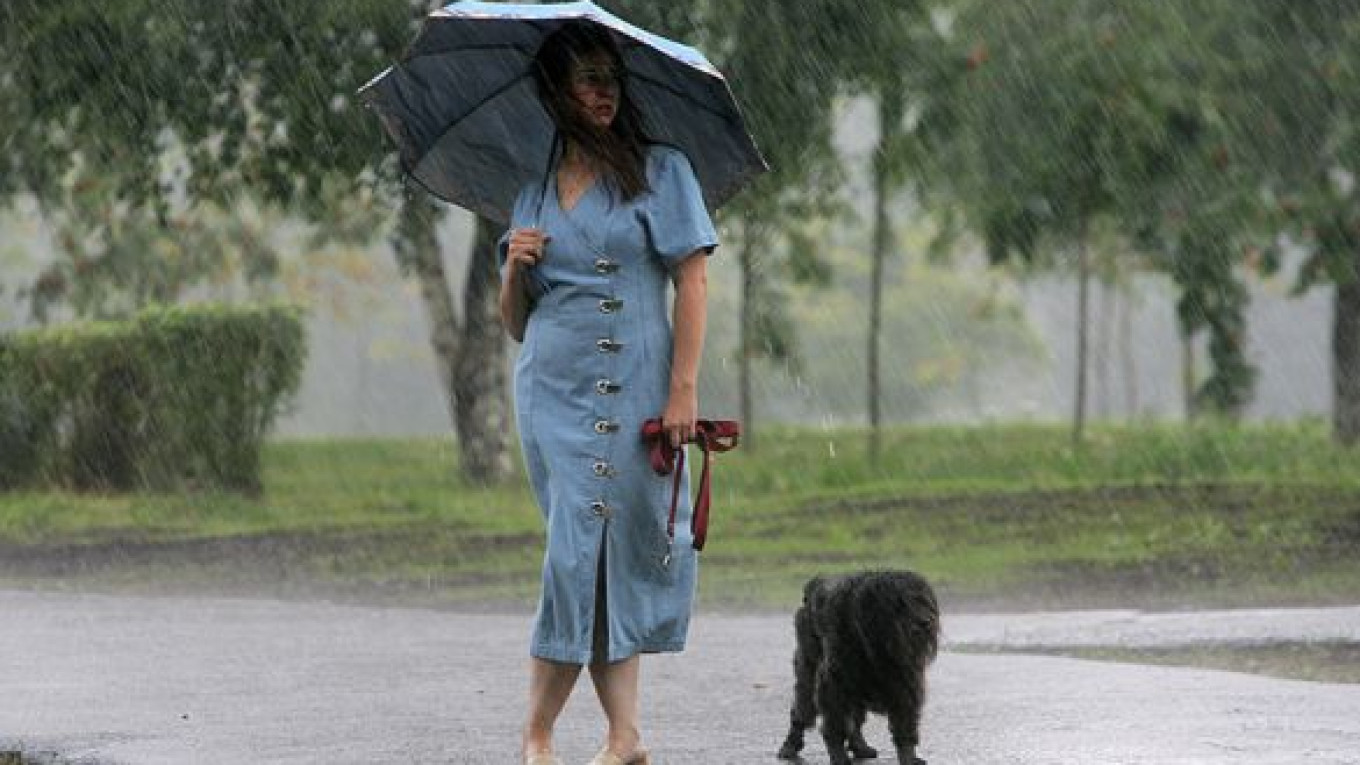?”???¶????: rain
Eskimos have 50 words for snow.” You’ve all heard it and believed it. They’ve got lots of snow up there, so it makes sense that they’d have a plethora of words to describe it. Right? Wrong. It’s a myth. The Eskimo languages don’t have more words for snow than English. Similarly, African nomads don’t have 100 words for camels, Pacific islanders don’t have 150 words for sand, and tribes in the Amazon jungle don’t have 200 words for river water.
But here’s a surprise: Russian has at least 12 distinct words for rain.
We all know two: plain old ?????¶???? (rain) and ?»?????µ???? (downpour). But there are more: ?????‚?????‡?µ??, a fine drizzle; ?????????…?»?‘???‚ and ?????????‚?‘???°, also called ?????????? ?????¶???? (literally, “slanting rain”), rain that is driven diagonally by the wind; ???€????????, ?…???¶?°, ?‡???‡?µ?€ and ?»?µ???µ????, snow mixed with rain; ?????€?????? and ?±????, which both mean a fine, sprinkling rain; and ???µ????????????, heavy rain that falls during and after the hay (???µ????) is cut and may rot it (???????‚??). These words were probably once important to rural Russians, whose lives depended both on the harvest and keeping warm and dry. Almost none of these words are used today, although you might hear ?????€???????‰???? ?????¶???? (drizzle) or ?????¶???? ?????€???????‚ (it’s drizzling).
Long ago, people also spoke of ???????€?‹?µ ?????¶???? (literally, “wet rains,” prolonged autumn rainfalls); ???€???·???‹?? ?????¶???? (rain in a thunderstorm — ???€???·?°); ???€?°?????‹?? ?????¶???? (rain with hail — ???€?°??); ???±?»???¶?????? ?????¶???? (prolonged rain that covers a large territory); ?????»???????????? ?????¶???? (rain that comes in bands — ?????»?????° — or waves); ???????€???‹?? ?????¶???? (quick-falling, pelting rain); and ???????°?»?????‹?? or ?????°?‚???‹?? ?????¶????, which is water sprinkled through a sieve in a bath house.
Today, you might hear about ???»?µ?????? ?????¶???? (literally, “blind rain”) or ???€???±?????? ?????¶???? (literally, “mushroom rain”). In my informal survey, everyone agreed that ???»?µ?????? ?????¶???? is a sun shower. One person remembered her grandmother telling her: ?”???¶???? ???µ ?????????‚, ?‡?‚?? ?????»???‹?????? ?????µ?‚???‚ (The rain doesn’t see that the sun is shining). People disagree, however, about ???€???±?????? ?????¶????. Some people said it was also a sun shower, but others said it was the gentle, warm, long rain that produces a good crop of wild mushrooms.
I understand that urbanites with umbrellas, rain slickers and rubber boots are probably less concerned with the subtleties of rain than barefoot peasants in homespun clothing. But it’s a shame that such evocative words and phrases have disappeared from common usage.
Today, we just add adjectives to talk about different kinds of rain, like ???€???»?????????? (pouring), ???µ?»?????? (fine drizzle) or ???€?°?‚???????€?µ???µ?????‹?? (brief rain, a shower). You can also change ?????¶???? to the diminutive ?????¶?????? to describe light or gentle rain.
There is a verb from ?????¶???? — ?????¶?????‚?? — but today it sounds either a bit folksy or, to the contrary, a bit bookish. ?? ???‚?€?° ?????¶?????‚ means “this morning we’ve had rainy weather.” The neutral verb to use with ?????¶???? is ?????‚??, as if rain were walking down to earth from the sky. Before you go outside, you might ask: ?”???¶???? ?????‘ ?µ?‰?‘ ?????‘?‚? (Is it still raining?) — and hope to hear the reply: ???µ?‚, ???€?????‘?» (No, it’s stopped; literally, “it’s walked by.”) Today, instead of different nouns for rain, Russians use different verbs: ???€?°???°?‚?? (to drip); ?…?»?µ???‚?°?‚?? (to pelt or pour down); ?…?»?‹?????‚?? (to gush, to start pouring).
As for me, I’m going to keep ???€???????? in my language pocket and use it the next time we have snowy rain — hopefully many months from now.
Michele A. Berdy is a Moscow-based translator and interpreter.


